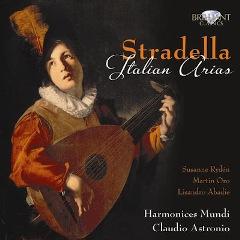Alessandro Stradella – Italian Arias (2011)
Alessandro Stradella – Italian Arias (2011)

CD 1 1.Toccata 2.E pazzia innamorarsi 3.Mio cor, che si fa? 4.Che mi giovan le vittorie 5.Fedeltà sinchè spirto in petto avrò 6.Adorata libertà, dal mio core non partir 7.Parti, fuggi dal mio seno 8.Il mio cor per voi, luci belle 9.Pria di scior quel dolce nodo 10.Begl'occhi, il vostro piangere 11.Se di gioie m'alletta il sereno 12.Cara e dolce libertà 13.Deh, frenate i furori 14.Non fia mai, ah no, ch'io speri 15.S'Amor m'annoda il piede 16.Le luci vezzose volgetemi, o Clori 17.Quanto è bella la mia stella 18.Ogni sguardo che tu scocchi CD 2 1.Chi mi disse che amor dà tormento 2.Pensier ostinato 3.Al rigor di due tiranni 4.Da Filinda aver chi può 5.Speranze smarrite 6.Il mio cor ch'è infelicissimo 7.Dell'ardore ch'il core distempra 8.Chi vuol libero il suo pie' 9.Delizie, contenti 10.Chi non porta amor nel petto 11.Chi avesse visto un core 12.Dormite, occhi, dormite 13.De1h, vola, o desio 14.Avete torto, occhi miei cari 15.Ti lascierò e a poco a poco 16.Torna, Amor, dammi il mio bene 17.Destatevi, o sensi, risvegliati, onore 18.Avrà pur d'aspettar più? 19.Bel tempo, addio, son fatto amante Harmonices Mundi: Susanne Rydén, soprano Martin Oro, countertenor Lisandro Abadie, baritone Alessandro Palmeri, cello Pietro Prosser, theorbo, lute, baroque guitar Hedwig Raffeiner, Rossella Croce, violin Claudio Astronio, organ, harpsichord, conductor
The story I have read about Alessandro Stradella involves his involvement with various plots in Rome during his early years, so much so that assassins were sent to seek him out. They found him conducting music in a church, but they made the mistake of stopping to listen. So profoundly moved were they that they stated something to the effect that anyone who was capable of such heavenly music deserved to live. And so instead of having to fight his way out of the predicament and possibly dying in the attempt, Stradella was allowed to go into exile to Venice. Where, of course, he promptly seduced the mistress of Count Alvise Contarini, thus honing his personal skills developed at the court of the notorious Queen Christina of Sweden at the Colonna Palace, where he had been apprenticed for some time. The tale may well be apocryphal, but it nonetheless serves as a wonderful reason behind the aspects of love that abound on this disc.
Many of his 300 or so works are centered on the subject of love, to no one’s surprise. These two discs contain no fewer than 36 solo arias, prefaced by one of his rarer moments of instrumental composition, a keyboard toccata. This is a complex contrapuntal work that is reminiscent of either Froberger or Frescobaldi, with generous sequences, echo effects, and imitation throughout. Had this been written by Johann Sebastian Bach it would be in the repertoire of every harpsichordist, but Stradella’s main interests lay in the realm of vocal music. The arias themselves all reflect his careful attention to the sentiments expressed in the poetry. He is not afraid to use musical devices to outline the often lyrical (and sometimes downright erotic) texts, such as turning to minor mode suddenly without warning, as he does in “Quanto è bella,” or using a basso ostinato to reflect the continuous rolling of thoughts in “Pensier ostinato.” In “Non fia mai” he exploits the dexterity of the line as if casting aside caution as the textual lover does when confronted with infidelity. Several of the arias were intended as insertions to operas by Cavalli, including “Dormite, occhi,” in which a lovely solo violin puts Giasone to sleep, while a tortuous harmony pervades the aria “Mio cor, che se fa?” This collection proves beyond a doubt that Stradella’s reputation for outlining a poetic text was entirely justified.
The ensemble Harmonices Mundi has proven itself a worthy interpreter of Stradella’s music. Soprano Susanne Rydén finely deflects the pitch at the appropriate moments of grief and anguish, making the harmony quite pungent with almost quarter-tone dissonance. Martin Oro’s fruity countertenor handles the lines with ease, while Lisandro Abadie has a virile, powerful bass. The various accompaniments are well chosen, from guitar, theorbo, or lute, while the violins enter as excellent counterpoint to the voice in those arias that are operatically derived. In short, this is an excellent rendition of these works, and I recommend it highly. ---FANFARE, Bertil van Boer
download: uploaded yandex 4shared mediafire solidfiles mega zalivalka filecloudio anonfiles oboom
Last Updated (Wednesday, 14 May 2014 11:19)








